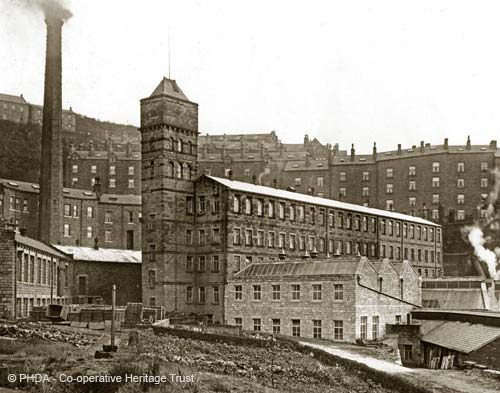Local History Society Report
All our own work: the story of the fustian co-operative at Nutclough Mill
Speaker:Andrew Bibby
Monday, 19 November 2018
The Nutclough Mill in Hebden Bridge was the home of a daring and visionary venture in industrial production: a worker-run co-operative which ran, at a profit, for almost fifty years and achieved national and international fame. Andrew Bibby, local author and member of the society, spoke to Hebden Bridge Local History Society about how this successful model of production was established and about its role in changing and shaping the character of Hebden Bridge.

The vision of a worker-run factory producing fustian cloth and sharing the profits came from Joseph Greenwood, son of poor handloom weavers, who was put to the trade of fustian cutter at the age of eight. He continued in the skilled but tedious occupation of wielding the sharp knife that cut the weft of the cloth until he was 36, all the time educating himself and determining that there must be a fairer way to organise work. As Andrew Bibby explained this was against a background of growing success of Co-operation after the foundation of the Rochdale Pioneers in 1844, and with movements such as Chartism and Owenite Socialism changing the way working people saw their roles and rights. Joseph Greenwood was one of those excited by these ideas.
The Nutclough venture started small, but with big ambitions, in 1870. Greenwood and his fellow workers had clubbed together to pay for the funeral of an old man whose death from exhaustion at work fired them with a sense of injustice. They determined that if they continued to make these small contributions, they could run their own fustian cutting business. They set up in premises in Crown Street with an initial plan to buy cloth, and to do the processes of cutting and dyeing then sell on the finished product. However, it soon became clear that they needed more capital than could be accrued by the 3d per week contributed by the 13 members. They made the crucial decision to sell shares to outsiders and also to change the model of production to make and sell garments from the finished cloth.
These decisions enabled them to buy the abandoned Nutclough Mill and to establish a profitable business making clothing of the heavy cotton corduroy cloth. They soon brought weaving into the process and the business ran at a profit for every single half year of its almost a half century of life. There were three types of membership – workers, outside investors and the co-operative stores who were the main customers. Joseph Greenwood insisted on the ‘bonus to labour’ as essential to his original vision, but much discussion was had about what constituted a fair return for those who invested money rather than labour.
Andrew was keen to emphasise the wider social influences of the Nutclough Mill co-operative on the life of Hebden Bridge. In the first place it was a significant employer, including of large numbers of women machinists. It was also instrumental in furthering the education of the people of Hebden Bridge, making links with the University of Oxford which were life changing for many. Some of the major influencers of working class education and political ideas sprung from the Hebden Bridge Fustian Society – weaver Robert Halstead’s life was transformed by the annual summer meetings at Oxford and he went on to be one of the founders of the Workers’ Educational Association. Martha Helliwell wife of the mill manager, was instrumental in the foundation of the first Women’s Co-operative Guild in Hebden Bridge. Jesse Gray, secretary of the Nutclough Co-op, rose to become a significant force in the national and international Co-operative movement.
A hundred years ago, in 1919, this ‘heroic little company’, a beacon and exemplar of how co-operation could work in manufacturing, was taken over by the gigantic force that was the CWS – Co-operative Wholesale Society – an omnipotent multinational. The Hebden Bridge Fustian Manufacturing Co-operative Society ceased to exist, though it had continued to be profitable until the end and its influence in the wider civic character of Hebden Bridge endures.
Andrew’s book ‘All our own work’ , exploring this fascinating topic is available locally.
The last meeting of the year on Wednesday 12th December is perhaps suitably celebratory: Peter Robinson will look at ‘Breweries and the licensed trade in the Upper Calder Valley during the 19th and 20th centuries.’ Meeting at Hebden Bridge Methodist Church starts at 7.30 – all welcome.
With thanks to Sheila Graham for this report
Details of all the Society’s activities can be found on the website and you can also follow them on their Facebook page.
See also
The first few episodes of Gentleman Jack (screenplay: Sally Wainwright) were inspired by two books written by local historian Jill Liddington, including Nature's Domain published by Pennine Pens


